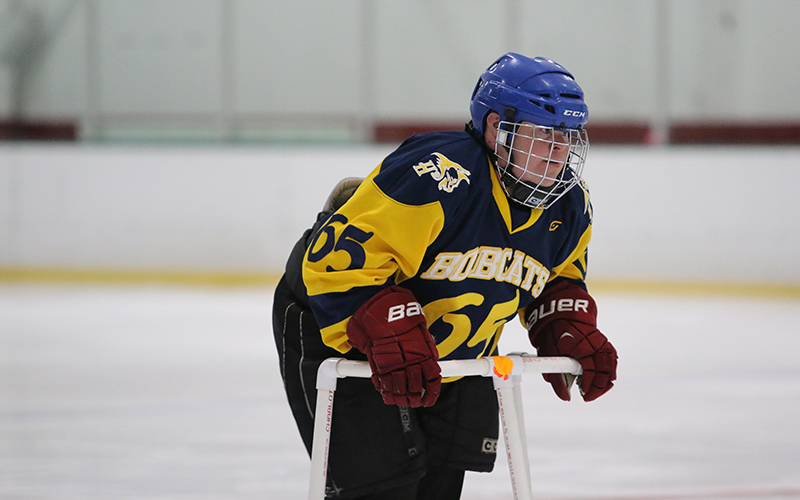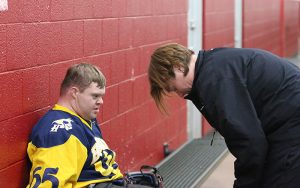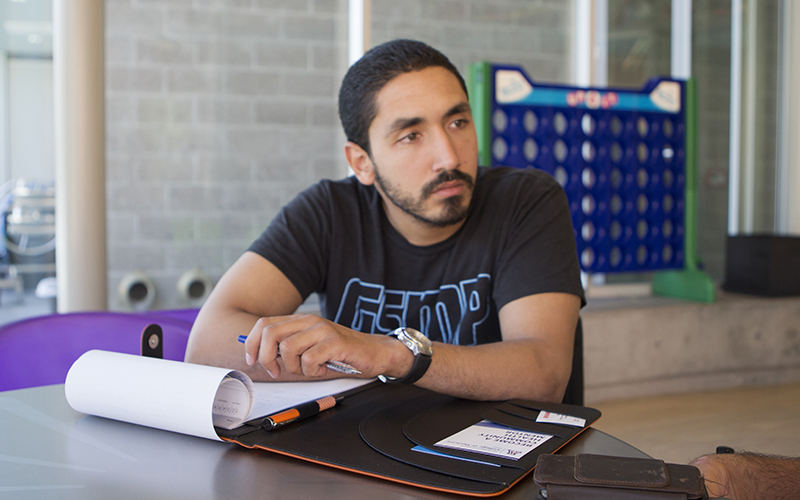
Casey Bagley takes the ice during the One Step Coyotes practice in Peoria. The Coyotes are believed to be the first hockey team serving the disabled community in Arizona. (Photo by Ricardo Ávila/Cronkite News)
PEORIA – Jared Woosley’s life went from head-banging to puck-slinging.
The lead singer of the now-inactive indie rock band Fivespeed, Woosley transitioned from having an album published on Virgin Records in 2006 to helping those in the disabled community.
It is a transition he has never regretted.
“I wake up excited to go to work every single day,” Woosley said. “We knew that we had the means to be able to put them on the ice … that was the mission. … Now they have hockey fever.”
Woosley is the founder and manager of the One Step Coyotes, the American Special Hockey Association branch of One Step Beyond, an organization that provides skills programs to the disabled community.
The Coyotes, founded in 2016, are believed to be the first ice hockey program available in Arizona to serve that group. Members practice at the AZ Ice Peoria rink.
“When we started, I didn’t think we would be the first,” Woosley said.
A variety of studies point to physical fitness as a benefit to those with developmental disabilities, including a 2015 one by New Jersey’s Rowan University which found exercise could help with anxiety and social skills.
Woosley, a hockey player himself, has been working with One Step for 10 years. He was inspired to start a hockey program for the disabled community when his father, who was a hockey enthusiast, passed away.
“It seemed like the right thing to do,” Woosley said.
Woosley admits he struggled with his comfort level when he first started working at One Step but then saw the participants “in a whole new light, and that disability goes out the window, man. You immediately see all the abilities that they have,” he said.
Woosley said the initial plan was just to have fun, but the program has grown because so many around the state expressed interest in playing ice hockey.
The Coyotes currently have a 45-player roster, said coach Mindy French, who has been working with the team for more than a year, and who also works for One Step.
Woosley and French had worked together at an ice rink previously and have known each other for years.
Woosley reached out to French about helping to coach the team, saying: “I’d love for you to come out.”
And she did.
“It’s been probably the best decision I’ve ever made,” French said.
On her first day, what French described as a “big bundle of joy” came running up to her. The bundle of joy introduced himself.
“Hi, I’m Casey Bagley, who are you?” he said.
Bagley, 31, was born with Down syndrome, a chromosomal condition that affects development, and had previously participated in other One Step programs. He practices with the team and trains individually with French.

Player Casey Bagley (left) and coach Mindy French enjoy being a part of One Step Coyotes, which is believed to be the first ice hockey program available in Arizona for the disabled community. (Photo by Ricardo Ávila/Cronkite News)
“They are working real hard for this team, for our Bobcats. …They’ve worked hard for this,” Bagley said. “She’ll always be my friend for always.”
Bobcats is the team’s previous name before being rebranded as the Coyotes.
In 2016, the Arizona Coyotes invited the then-Bobcats to Gila River Arena, where the NHL club plays. The One Step Coyotes received personalized jerseys and were allowed to skate on the ice.
Now, the NHL team allows the ASHA team to use the Coyotes name and uniforms.
“One Step has provided Casey with a base of friends, of peers. … One falls down, and two or three go over to help them get back on their feet,” said Royal Bagley, Casey’s father.
Royal Bagley said he hopes Casey experiences the satisfaction of playing the game of hockey and learning how to skate.
“He doesn’t have to be a superstar. He’ll be a superstar no matter what,” he said.
French said the One Step Coyotes have taught her about patience and time, but also about having fun.
“They make your day bright,” she said.
French said her biggest challenge as a coach is to learn more about members of the disabled community and how far she can push them.
When he first joined the Coyotes, Casey navigated the rink in a wheelchair. Now, he skates standing up, leaning on a plastic rig for support.
“My relationship with Casey is great. I love that boy,” French said.
Casey is his Down hero, Royal said, and he recommends One Step to other parents of children in the disabled community.
“Casey is your normal, special-needs boy that wants to participate,” Royal said. “And I would suggest that if there are parents out there that want to put their kids into something that needs to be an activity, this is it.”
The Coyotes begin playing games, typically among themselves and occasionally against other teams, in November. They practice twice a week.
Casey scored a goal the first time he stepped on the ice. And he’s not done yet.
“Get ready for this. We’re gonna win this thing,” he said. “Let’s do it right.”
Follow us on Twitter.
